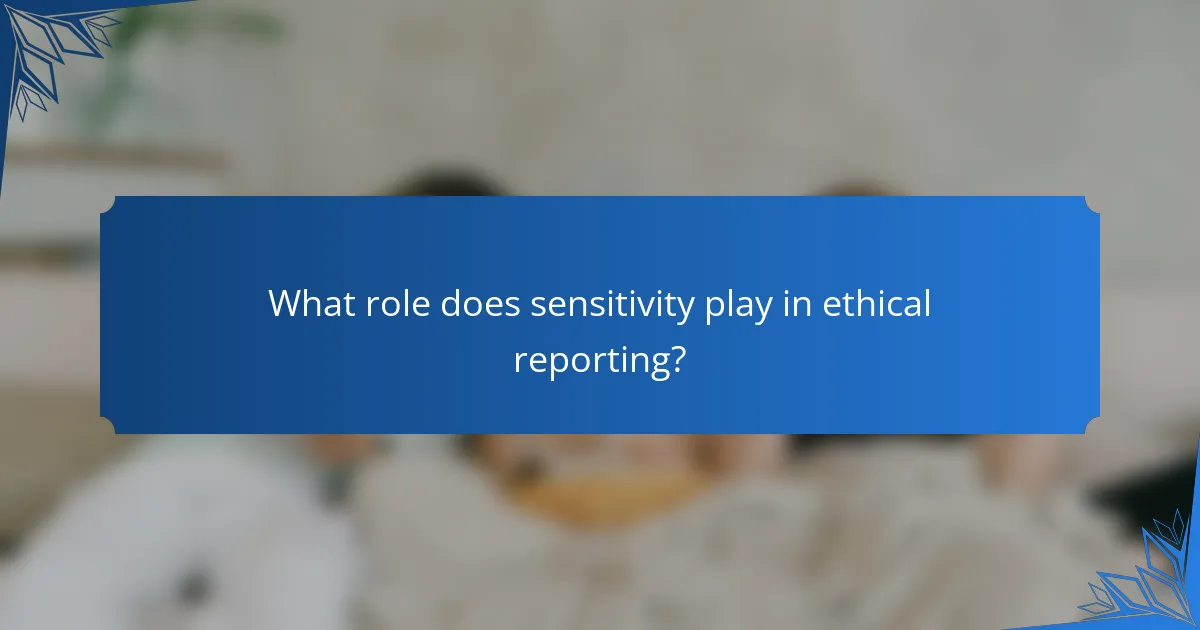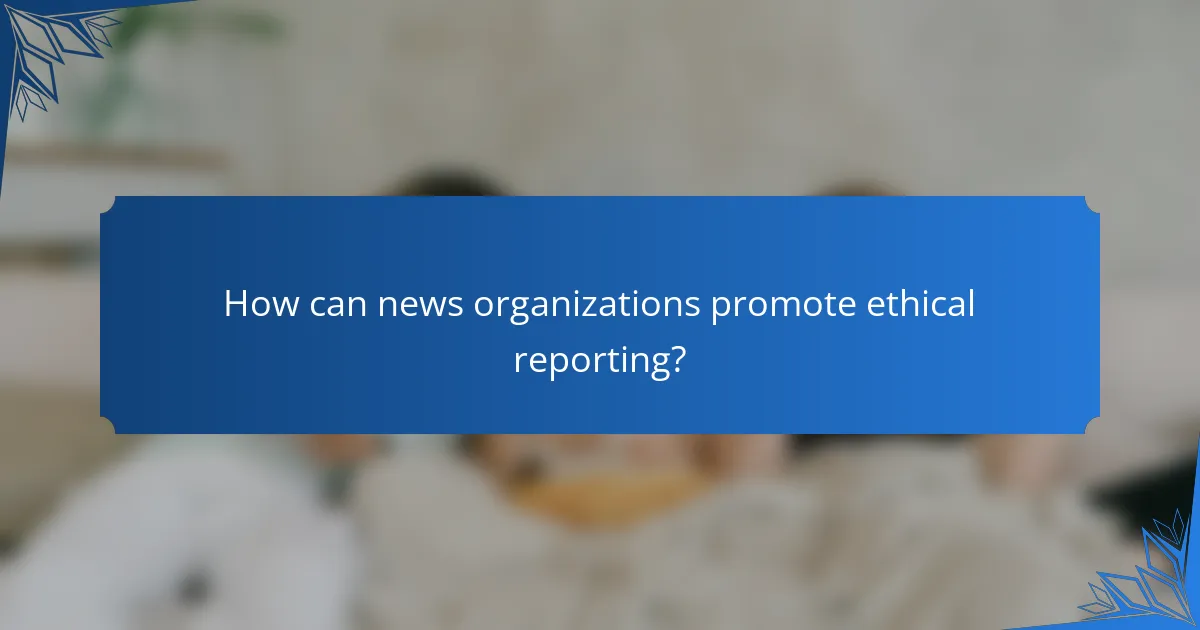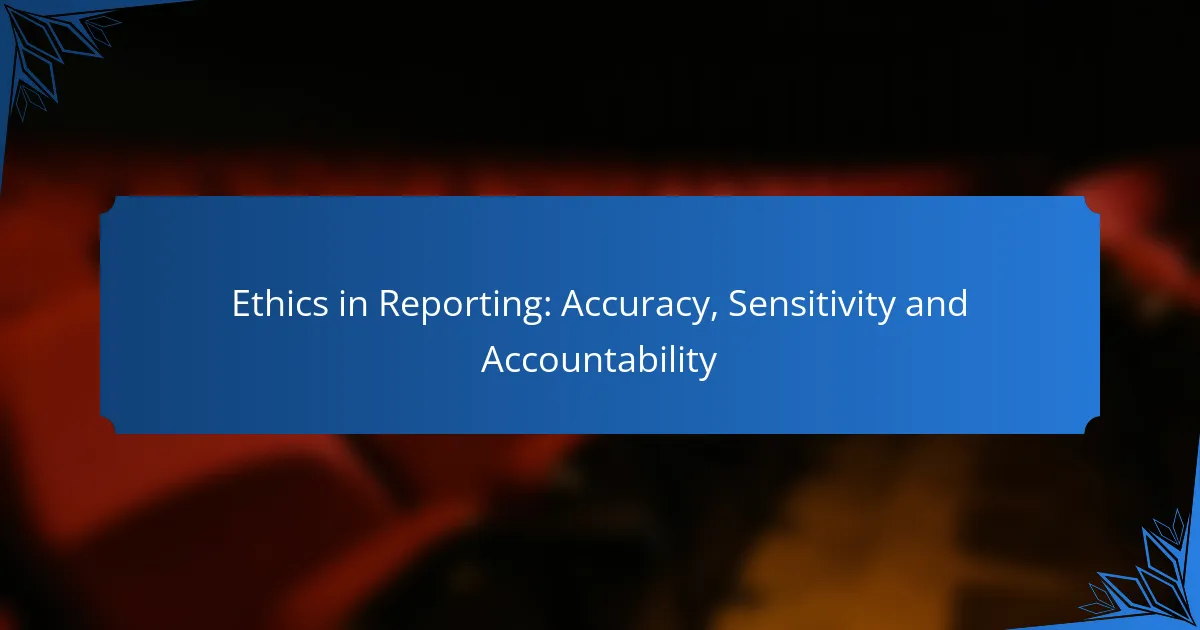Ethics in reporting is crucial for maintaining the integrity of journalism, encompassing accuracy, sensitivity, and accountability. By prioritizing rigorous fact-checking and reliable sources, journalists can build trust with their audience while being mindful of the emotional impact their stories may have on individuals and communities. Furthermore, implementing accountability measures fosters responsible reporting and enhances public confidence in the media.

How can journalists ensure accuracy in reporting?
Journalists can ensure accuracy in reporting by implementing rigorous fact-checking, utilizing reliable sources, and verifying data before publication. These practices help maintain credibility and trust with the audience.
Fact-checking processes
Fact-checking is a critical step in the reporting process that involves verifying the information before it is published. Journalists should establish a systematic approach to fact-checking, which may include using dedicated fact-checking teams or software tools. This process helps to identify errors and prevent the dissemination of false information.
Common methods include cross-referencing claims with established databases or consulting experts in the relevant field. Journalists should aim to confirm facts from multiple independent sources whenever possible.
Use of reliable sources
Using reliable sources is essential for accurate reporting. Journalists should prioritize information from reputable organizations, experts, and primary sources over unverified or anonymous tips. This practice not only enhances the quality of the reporting but also builds trust with the audience.
When selecting sources, consider their expertise, track record, and potential biases. For example, citing academic studies or government reports can lend credibility to a story, while relying on social media posts may lead to inaccuracies.
Verification of data
Verification of data involves checking the accuracy of statistics, figures, and other quantitative information. Journalists should seek out original data sets and confirm their authenticity before including them in their reports. This can include reaching out to organizations that published the data or consulting industry experts.
Utilizing tools like data visualization software can also help in presenting data accurately and clearly. Always ensure that the context of the data is understood to avoid misinterpretation.
Cross-referencing information
Cross-referencing information is a technique where journalists compare facts from different sources to ensure consistency. This method helps to identify discrepancies and verify the reliability of the information being reported. Journalists should maintain a habit of checking multiple outlets and databases for corroborating evidence.
A practical approach is to create a checklist of key facts and sources to compare against each other. This can be particularly useful in complex stories where multiple viewpoints and data points are involved.
Training in media literacy
Training in media literacy equips journalists with the skills to critically evaluate information sources and understand the media landscape. This training can include workshops on recognizing bias, understanding misinformation, and ethical reporting practices. Such knowledge is vital for maintaining accuracy in journalism.
Encouraging ongoing education and professional development can help journalists stay informed about best practices and emerging trends in media. This commitment to learning fosters a culture of accountability and accuracy in reporting.

What role does sensitivity play in ethical reporting?
Sensitivity in ethical reporting ensures that journalists consider the emotional and psychological impact of their stories on individuals and communities. It involves balancing the need for accurate information with respect for the dignity and feelings of those affected by the news.
Understanding audience impact
Journalists must recognize how their reporting can influence public perception and emotional responses. Stories that involve trauma or sensitive subjects can evoke strong reactions, so it’s crucial to present information thoughtfully. For instance, using graphic details may sensationalize an event and cause distress, while a more measured approach can foster understanding.
Respecting privacy of subjects
Respecting the privacy of individuals involved in news stories is a fundamental ethical obligation. Reporters should avoid disclosing personal information unless it is essential to the story and done with consent. For example, when reporting on victims of crime, it is often best to anonymize identities to protect them from further harm.
Language and tone considerations
The choice of language and tone can significantly affect how a story is received. Using compassionate language can help convey sensitivity, while harsh or judgmental words can alienate readers. For example, referring to individuals as “survivors” rather than “victims” can empower them and reflect a more respectful perspective.
Handling trauma-related stories
When reporting on trauma-related stories, it is essential to approach the subject with care and empathy. Journalists should provide context and avoid glorifying violence or suffering. Additionally, offering resources for support at the end of such articles can be a responsible way to assist readers who may be affected by the content.

How do accountability measures affect journalism?
Accountability measures significantly enhance journalism by ensuring that reporting is accurate, responsible, and responsive to public concerns. These measures promote trust between journalists and their audience, ultimately leading to higher standards in news reporting.
Establishing editorial standards
Establishing editorial standards is crucial for maintaining consistency and quality in journalism. These standards typically include guidelines on accuracy, fairness, and impartiality, which help journalists navigate complex stories while upholding ethical practices.
For example, a news organization might adopt a policy that requires multiple sources for any controversial claim, ensuring that reporting is well-supported and credible. This fosters a culture of accountability where journalists are expected to adhere to these standards rigorously.
Implementing corrections policies
Implementing corrections policies is essential for addressing errors transparently and promptly. A clear corrections policy allows news organizations to rectify mistakes in a way that maintains credibility and trust with their audience.
Many outlets have dedicated sections on their websites for corrections, making it easy for readers to find updates. This practice not only demonstrates accountability but also encourages a culture where accuracy is prioritized over speed.
Transparency in reporting
Transparency in reporting involves openly sharing the processes and sources behind news stories. This practice helps audiences understand how information is gathered and verified, which can enhance trust in the reporting.
For instance, journalists might disclose their sources or the methods used to obtain information, especially in investigative pieces. This openness can help mitigate skepticism and reinforce the integrity of the reporting process.
Engagement with audience feedback
Engagement with audience feedback is vital for fostering a two-way relationship between journalists and their readers. By actively seeking and responding to feedback, news organizations can better understand public concerns and improve their reporting.
Tools such as social media platforms and comment sections allow audiences to voice their opinions and questions. Journalists who engage with this feedback can refine their coverage and demonstrate accountability to their audience, ultimately enhancing the quality of journalism.

What frameworks guide ethical journalism practices?
Ethical journalism practices are guided by established frameworks that ensure accuracy, sensitivity, and accountability. These frameworks provide journalists with principles to navigate complex situations and uphold public trust.
Society of Professional Journalists Code of Ethics
The Society of Professional Journalists (SPJ) Code of Ethics emphasizes four key principles: seek truth and report it, minimize harm, act independently, and be accountable. Journalists are encouraged to verify information before reporting and to provide context to avoid misleading the audience.
For example, when covering sensitive topics such as crime or personal tragedy, journalists should consider the potential impact on those involved and strive to balance the public’s right to know with the need for compassion. This approach fosters a responsible reporting environment.
International Federation of Journalists guidelines
The International Federation of Journalists (IFJ) guidelines focus on promoting ethical standards across borders, emphasizing the importance of accuracy, fairness, and respect for sources. These guidelines encourage journalists to avoid sensationalism and to provide a platform for diverse voices.
In practice, this means journalists should seek out multiple perspectives when reporting on controversial issues and ensure that marginalized communities are represented fairly. Adhering to these guidelines helps maintain credibility and fosters trust in journalism globally.

How can news organizations promote ethical reporting?
News organizations can promote ethical reporting by implementing structured training, establishing oversight committees, and conducting regular audits. These practices ensure that journalists adhere to principles of accuracy, sensitivity, and accountability in their work.
Training programs for staff
Training programs are essential for equipping journalists with the skills needed for ethical reporting. These programs should cover topics such as fact-checking, sensitivity in reporting, and understanding the impact of their stories on communities.
Organizations can offer workshops, online courses, and mentorship opportunities to reinforce ethical standards. Regular updates to training materials can help staff stay current with evolving ethical guidelines and societal expectations.
Creating an ethics committee
Establishing an ethics committee helps ensure accountability within news organizations. This committee can consist of experienced journalists, editors, and external advisors who review reporting practices and address ethical dilemmas.
The committee should meet regularly to discuss potential ethical issues and provide guidance on complex situations. By fostering an environment of open dialogue, organizations can enhance their commitment to ethical reporting.
Regular audits of reporting practices
Conducting regular audits of reporting practices allows news organizations to assess their adherence to ethical standards. These audits can identify areas for improvement and ensure that journalists are following established guidelines.
Audits can include reviewing published articles for accuracy, sensitivity, and fairness. Feedback from these evaluations should be used to inform future training and policy adjustments, reinforcing a culture of accountability and ethical responsibility.



